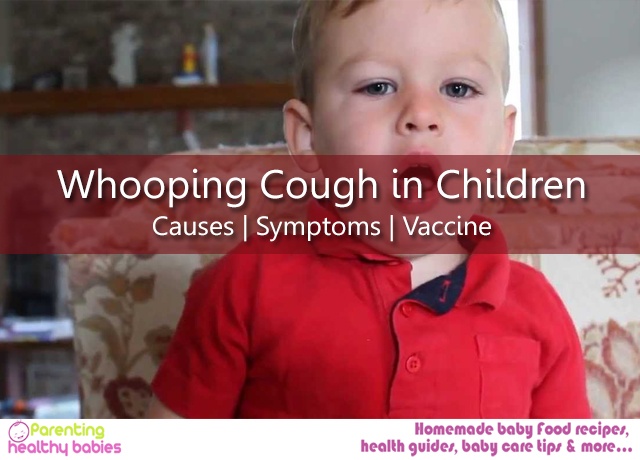Children tend to have a less strong immune system compared to the adults and that is one of the reasons they get affected by certain elements in growing up years. Of these, some respiratory ailments can prove to be quite menacing. One of these is whooping cough. Medically called pertussis, it is a type of bacterial infection which inflames the airways and lungs. The bacteria also affect the windpipe leading to a persistent fit of cough. Typically, Whooping cough affects kids less than a year old who are yet to be immunized. It also affects kids stepping into adolescence whose immunity is fading. The name is derived from a birdlike “whooping” sound made by the kids who are afflicted by this ailment. This sound is produced as affected babies try to take a deep breath between fits of coughs.
Read More: 11 Natural Remedies to Cure Whooping Cough in Babies
Symptoms of Whooping Cough in Children
It is important that you learn the symptoms of whooping coughs. This will be helpful to differentiate from regular cough which also affects the babies often. The symptoms are:
- Sneezing
- Mild cough
- Runny nose
These can go on for more than a week before the persistent phase begins. Sometimes, the affected kids may develop fever too. Kids affected by this ailment typically cough nonstop for half a minute and then try to breathe before they resume coughing again. This coughing pattern can help you spot whooping cough. Some kids may develop bluish nails and lips at such times. In some babies, gasping for breath is what people see than recurrent fits of coughing. Those into teens may not get coughing fits that much.
Read More: 5 Ways to Interpreting Your Baby’s Cough
What is the difference between Whooping cough and common cold?
In whooping cough, the recurring fits of heavy coughing are the identifying sign. In regular cough, kids will not gasp for breath as is the ace in whooping cough.
Risk of complications
While the death rate of babies affected by whooping cough has reduced drastically compared to the yesteryears, the risk of complications cannot be overlooked. Babies who are less than a year old can be vulnerable to developing complications like convulsions and pneumonia. Brain damage is also a possibility in some cases.
How the kids contract whooping cough?
As a matter of fact, whooping cough is quite contagious in nature. The kids may get it through tactile contact or by breathing in bacteria infested air. It can also be spread through food.
Read More: 11 Home Remedies for Whooping Cough in Children
Treatment options for Whooping cough
The doctors usually examine the medical history of the kid and perform a comprehensive physical exam. They also get throat mucus samples checked to confirm the diagnosis. In some instances, they can also carry out chest X-ray and certain blood tests.
The experts think antibiotics shorten the duration of the infection and even when they are applied at a later stage of infection, the bacteria get eliminated eventually.The doctor may offer medications without waiting for test results if he/she suspects the child has whooping cough in some cases. Usually, apt antibiotic doses are given to the kid so that he/she can fight the infection well. If it is given at an early stage of infection, antibiotics can help in bringing relief. After applying antibiotic, you can just wait for the symptoms to recede. This may take up to 10 weeks.
It is not advisable to give the kid cough suppressant unless the doctor recommends it. This will be equivalent to suppressing the infection. This may actually delay the natural healing process of the body and the kids may also develop side effects. Sometimes, the cough can worsen after application of the antibiotic. In such cases, you should update the doctor at the earliest. In some serious cases, the kids may have to be hospitalized and intravenous fluids are given to help prevent dehydration. This usually happens to children younger than 6 months. Sometimes, they may need to be given oxygen.
What is the purpose of a whooping cough vaccine?
The pertussis vaccine is given to prevent occurrence and recurrence of whooping cough. It is given as part of DTaP immunization. These immunizations are given in 5 doses prior to the 6th birthday. Sometimes, kids stepping into teenage may also need this vaccine.
Home care practices to follow
While getting your child vaccinated and getting him/ her treated with antibiotics is required to eliminate whooping cough, you need to adopt cautionary measures. When the child is being treated at home, you should adhere to certain hygiene practices to ensure the infection does not spread easily. These are:
- Make sure the child can rest and you may use a suitable cool-mist vaporizer to soothe his/her irritated breathing passages and lungs.
- It is also important that you keep the rooms devoid of airborne irritants at this time. Using an air purifier device is a good idea. This can keep pollens, pet fur and dust mites away.
- Ensure that smoke and vapor of varying types do not enter the room where the baby is resting. So, smoke emitted by chimneys and tobacco should not be allowed in such places.
- You should practice good hygiene habits. It would be a good idea to wash hands with a medicated hand wash or sanitizer.
- A section of babies affected by whooping cough may face difficulty in eating and digesting food. So, the affected kid may sometimes just vomit the food and refuse to eat meals. So, you should ideally offer him/her meal in smaller amounts. You should give the kid more water and fluid to drink during this time.
When to call the doctor
You should know when to call the doctor if the child is afflicted with whooping cough. You should watch out for the following factors:
- The lips of a child may turn purple, red or blue.
- The child can vomit after recurrent coughing.
- A weird sound accompanies the coughing.
- The child has difficulty in breathing.
Natural remedies for whooping cough
While the importance of vaccine cannot be undermined to cure whooping cough in the kids, it is possible to try some home remedies at times. These herbal and natural extracts help in combating the infection to an extent. These are:
- Saffron– This fragrant spice has proven antibacterial properties. You can mix saffron in warm milk and strain it before giving to the kid. It soothes the airways too.
- Oregano oil- It is known for efficacy in curing respiratory infections. Oregano has antispasmodic, expectorant and antibacterial properties. Mix oregano oil with olive oil and rub on the chest of the child.
- Garlic – This herb is known for strong anti-bacterial properties. However, the kids may find the pungent smell too overpowering. So, you can crush garlic in honey and mix with warm water. Give this to the child for sipping.
- Chamomile– You can make an infusion of chamomile in hot water and strain it. Give this infusion to the child after adding some honey and lemon juice.
- Turmeric– A common household spice, turmeric can be used to battle whooping cough in the kids. You can mix turmeric, with milk and honey and give the mixture to the child for drinking- a few times every day.
- Ginger– Ginger is known for its anti-inflammatory properties. It is a nice expectorant and also has antibacterial properties. It helps eliminate the bacteria easily. You can mix ginger juice and honey and give it to the kid for drinking.
- Lemon– The citric acid in lemon helps bring down mucus in the throat to an extent. It has proven antiviral and antibacterial properties which will fight the infection. You may make a lemon drink by mixing lemon juice and honey in lukewarm water. Give the drink to the kid a few times each day. The irritation in the throat will get reduced.
- Honey– Honey is a powerful antibacterial agent of nature. You can give the child a few drops of honey each day during this treatment stage. You may mix honey in milk or any fruit juice as well.
However, not all kids may respond to these home remedies equally. An overdose of these remedies administered to a kid may also cause side effects eventually. In fact, some of the kids may be allergic to some of this stuff. So, administer these remedies only after talking with your doctor.
Where it all leads to?
So, you can see that treating whooping cough in kids is not tedious if you get the basics right. First of all, you need to learn the symptoms well. You also need to know the ways to spot the differences between a regular cold and cough. Timely medical intervention and vaccination go a long way in eliminating the infection. However, even after getting the vaccination, the chance of recurrence still looms. Along with antibiotics, you need to adopt suitable home care measures to ensure the child recovers well. While administering herbal or home remedies can be helpful, you should not resort to these without talking with the doctor.
Hope this article was of help for all our parents!! Please share your comments/queries/tips with us and help us create a world full of Happy and Healthy Babies!!













